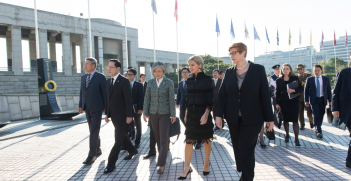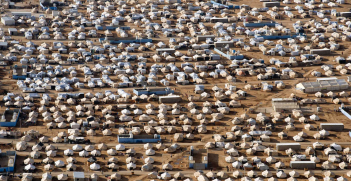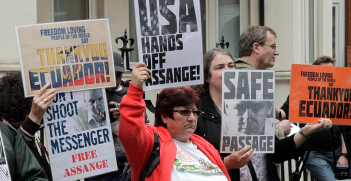“Events”, the G20 and Malcolm Turnbull’s First Tour as PM

The dreadful terrorist attacks in Paris came during Prime Minister Malcolm Turnbull’s first overseas visits to Indonesia, Germany, Turkey, the Philippines and Malaysia. After initial bilateral talks with Indonesian President Joko Widodo, Australia’s new PM went on to major international events, including the G20.
When asked what the biggest obstacle to making policy and providing leadership was, former British Prime Minister Harold Macmillan is said to have replied, ‘events, dear boy, events’. Malcolm Turnbull might put things in slightly less patrician prose but after this week’s events he’s unlikely to disagree.
Turnbull’s first tour as prime minister was an opportunity to meet some of his more important peers in the most exclusive of international clubs: national leaders. On the whole things have gone rather well, albeit in ways that he might not have imagined. The fact that things turned out as they did tells us much about the challenges that confront both individual leaders and the institutions that provide the mechanisms for them to meet – and even do things, on occasion.
Lest this sound too cynical I take my cue from former Foreign Minister and now University of Western Australia colleague, Stephen Smith, who says that a large part of international diplomacy is simply turning up. Those people – like me – who think that there are too many, largely ineffective, international institutions and meetings miss the point, Smith argues. While the “deliverables” may not always inspire, simply being there is what matters.
To judge by the events of the last few days, there’s plainly something in this. If the G20 does nothing else, it does provide a venue in which Australian leaders can play an active role, meet their counterparts and generally get noticed. Whether the G20 itself is actually going to live up to the rather inflated expectations of its principal architects when it comes to dealing with specific problems is another question altogether.
Indeed, the G20 highlights many of the problems that confront both our over-burdened leaders and the institutions they create. It’s worth remembering that the G20 was originally seen as a mechanism to deal with economic problems. Its promotion to a leaders’ summit was driven by the need to develop an effective response to intensifying economic crises that threatened to do real damage to the economies of the rich Western world.
They still do. The reality is that the G20 hasn’t been terribly good at addressing the underlying “structural” problems that allowed the global financial crisis to wreak such havoc in the first place. Not only are many financial institutions still “too big to fail”, but the vested interests that used their political leverage to undermine effective regulation of the financial sector has not been reined in either.
Meanwhile the G20 itself has morphed into a summit that either reflects the interests of the hosts, or the crisis du jour, or both. When Australia last hosted the G20 at considerably expense, then Treasurer Joe Hockey’s big idea was that the members should try to boost economic growth. Unobjectionable enough, perhaps, but presumably something the members did not actually need to be reminded about.
In Turkey, contingency rules. The summit provided an opportune moment and venue for the leaders to consult and perhaps to act in response to the attacks on Paris. However, breath should not be held. In the unlikely event that concrete proposals – other than bombing the rubble in Syria – emerged, actually putting them into practice will be another thing altogether.
While Turnbull’s travels may have been overshadowed by these events he has still had a useful opportunity to look statesmanlike, make sympathetic noises and generally look credible and articulate. As we know from recent history, none of these attributes are a given in international leaders. Striking up an apparent rapport with Joko Widodo in the space of a few hours is no mean achievement and bodes well for the future of that problematic partnership.
The trip may also have served the potentially useful purpose of curbing megalomania and delusions of grandeur. To Turnbull’s credit he doesn’t seem quite as prone to these proclivities as some of his predecessors. Any lingering ideas that Australia can save the world ought to have been laid to rest by his introduction to both the G20 and some of his clearly floundering counterparts.
The international struggle to deal with novel and highly effective security challenges is clearly not going well. Nevertheless, institutionalised international cooperation is likely to be part of any effort to deal with new threats to international stability – be they from terrorists or chaps in expensive suits.
Turnbull has made an impressive start and clearly has an ability to think on his feet and say things that are thoughtful in every sense of the word. Unfortunately, the initial focus on much-needed domestic renewal looks in danger of being swamped by a rising tide of security concerns. This is the problem of unforeseeable, uncontrollable “events”.
Whether he will prove any better at responding to them and translating good intentions into meaningful action remains to be seen. It hardly needs adding that the stakes could not be much higher for him or for the rest of us.
Mark Beeson is a Professor of Political Science and International Relations at the University of Western Australia. This article can be republished with attribution under a Creative Commons Licence.





